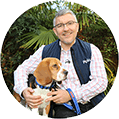Going to meet a litter of puppies is incredibly exciting—but how do you choose which one to take home? While love at first sight is certainly possible, this article has some more practical tips for selecting the perfect pup.
Puppies might be small, but they still need quite a lot of equipment. If you’re not sure where to start, Petplan’s checklist for getting a puppy rounds up all the essentials, plus some tips on how to choose the best options for your puppy.
Welcome home, puppy!
● Collar and ID tag
Mark your phone number and address on your puppy’s tag so you can get reunited as quickly as possible if something goes amiss. The collar should be adjustable and you need to keep checking that it’s not too tight as your puppy grows.
● Harness
Some people prefer to attach their lead to a harness rather than a collar. A comfortable harness will protect your puppy’s neck if they lunge or jump for joy. Don’t forget to keep adjusting the harness as your pup grows.
● Lead
In an urban setting, you may want to consider a shorter lead so that you can keep your puppy close. A longer lead will let your dog sniff and explore safely, and it’s a good choice for quieter settings.
● Cosy bed
A cosy bed is essential for your pup. You may not want to spend lots of money on a plush bed until your puppy is potty trained. So don’t hesitate to start with a few soft towels that you can easily pop into the washing machine.
● Toys
A variety of puppy-safe toys will keep young minds active. (Plus, they’ll keep your favourite pairs of slippers out of the firing line!)
● Insurance
Investing in insurance can bring peace of mind in case your puppy needs veterinary treatment. This getting a puppy checklist will tell you what other arrangements you need to make before your pup comes home.
Dinner is served
● Food and water bowls
Stainless steel water bowls are non-toxic, easy to clean, and will survive enthusiastic puppy teeth.
● Good quality puppy food
Many health problems like obesity and skin conditions can be associated with diet. Your puppy needs high-quality food, suitable for their age and breed. When you first bring your pup home, it’s best to keep them on the same food they’re used to and gradually wean them off it – speak to your vet if you need some advice.
● Treats
Chew treats can be a great way to reduce stress and keep your puppy’s teeth clean. Just avoid large rawhide bones or yak cheese chews which can be a choking hazard. You’ll also want some high value treats for positive reinforcement training. If you’re feeling creative, you could even make some puppy-friendly treats yourself!
Health and safety
● First-aid supplies
Keep some simple medical supplies on hand. That could include antiseptic spray for cuts and scrapes, bandages, and tweezers.
● Grooming kit
Your grooming supplies will depend on the breed of puppy. Long haired pups may need a deshedding comb, but shorter haired dogs may do well with a soft bristle brush.
● Toothbrush and toothpaste
Most professionals recommend brushing your puppy’s teeth a couple of times a week. You will need to introduce this slowly and gently.
● Crate
A crate can be a safe place for your puppy to stay when you cannot supervise them, but take the time to crate train your puppy properly.
What a mess!
● Poop bags
You’ll need to get some poop bags for when you’re out on a walk. You may want to consider biodegradable bags, which are better for the environment.
● Dog shampoo
While regular brushing is better for your pup’s skin than baths, you may need to give them the occasional wash. Choose a hypoallergenic, puppy-friendly, shampoo. We highly recommend you do a small patch test with the shampoo before going ahead with a full body wash.
● Rags
It’s great to have some old rags on hand to wipe muddy paws after a walk. You can throw them in the washing machine after use and save a lot of money compared to buying grooming wipes.
● Puppy pads
Puppy pads can be handy when you’re potty training your dog. Disposable pads are convenient, but they are expensive over time. Washable puppy pads can help you save money and reduce waste.
● Enzyme cleaner
If your puppy does have an accident, you want to clean it up with an enzyme cleaner. If your puppy can smell traces of their previous accidents, they may designate that area as their toilet.
On the move
● Car accessories
Your puppy needs to travel safely, even for a short drive to the vets. Consider getting a doggy seat belt that attaches to the harness, installing a grate between the boot and the rest of the car, or securing a crate in your vehicle. Seat covers will help protect your car seats from muddy paws and dog hair.
Are you feeling ready for your new puppy? Let us know by heading over to our social media channels and make you use #PethoodStories.
